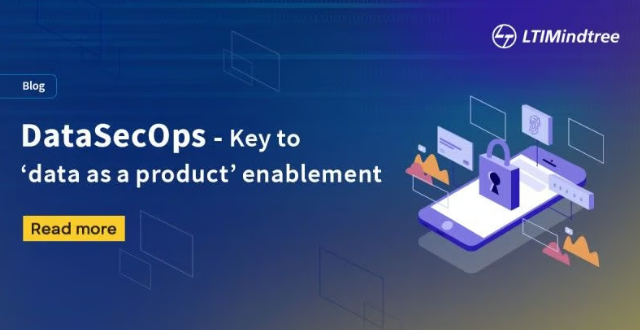In the realm of data operations, businesses have shifted their focus towards treating data as a valuable product rather than a mere resource. This paradigm shift has given rise to Data as a Product, a concept that emphasizes applying key product development principles to data projects. One of the crucial components driving this transformation is DataSecOps, a revolutionary approach that integrates data operations with robust security measures. Let's delve deeper into the realm of DataSecOps and understand its significance in today's data-driven world.
Data as a Product
- Product thinking: A strategic mindset focused on improving business outcomes through data-driven insights.
- Data products: Transforming raw data and algorithms into actionable intelligence to drive business growth.
Embracing the principles of product thinking, Data as a Product fosters a culture of innovation and data-driven decision-making within organizations. By aligning data strategies with business objectives, companies can unlock the true potential of their data assets and drive sustainable growth.
Why DataSecOps Matters
With the emergence of DevOps and cloud technologies, the importance of integrating security seamlessly into the data lifecycle has become evident. Similar to the evolution of DevSecOps for application security, DataSecOps emphasizes the integration of security practices into data operations. As data increasingly moves to the cloud, organizations are compelled to adopt DataSecOps to ensure data integrity, confidentiality, and availability.
Data Democratization
The era of Data Democratization has empowered organizations to democratize data access and enable users across various functions to derive insights from vast data repositories. Cloud-based data storage solutions have paved the way for seamless data querying and analysis, allowing individuals with basic SQL skills to harness the power of organizational data. This democratization of data facilitates informed decision-making and drives innovation across the enterprise.
DataOps vs. DataSecOps
Amidst the growing demand for data analytics and insights, DataOps and DataSecOps have emerged as essential methodologies to manage evolving data requirements. While DataOps focuses on enhancing data flow communication and automation, DataSecOps prioritizes data security and compliance within the data lifecycle. By embracing these practices, organizations can establish a cohesive data management framework that accelerates data-driven initiatives and optimizes resource utilization.
What is DataSecOps?
DataSecOps, a combination of data, security, and DevOps, is an emerging approach that focuses on integrating security practices into the data management process. It aims to ensure data privacy, safety, and governance while enabling data as a valuable product. By adopting a DataSecOps approach, organizations can maximize the value of their data while maintaining robust security measures.
Key Principles of DataSecOps
- Agility: DataSecOps emphasizes agile practices to enable faster and more flexible data operations. It promotes iterative development, continuous integration, and rapid deployment of data systems. This allows organizations to respond quickly to changing data requirements and adapt to evolving security challenges.
- Security by Design: DataSecOps integrates security measures throughout the entire data management lifecycle. It involves implementing security controls, such as encryption and access control, from the initial stages of data collection to its storage, processing, and analysis. This ensures that data remains secure at all times.
- Collaboration: DataSecOps encourages collaboration between data and security teams. By aligning their goals and expertise, these teams can collectively develop and implement security measures during every phase of the data pipeline. Collaboration helps to identify and address potential security risks early on, reducing the chances of data breaches or unauthorized access.
- Automation: DataSecOps relies on automation to streamline and enhance data security practices. Automated processes, such as continuous monitoring, vulnerability scanning, and threat detection, enable proactive identification and mitigation of security risks. Automation also improves efficiency, allowing data teams to focus on value-adding tasks.
- Continuous Improvement: DataSecOps promotes a culture of continuous improvement by regularly evaluating and enhancing security practices. DataSecOps teams adopt a proactive approach to identify potential vulnerabilities, implement remediation measures, and learn from incidents to strengthen data security further.
By embracing DataSecOps, organizations can ensure that data management practices align with security requirements. This approach enables them to harness the full potential of data as a valuable product while safeguarding data privacy and trust. Implementing DataSecOps principles empowers businesses to navigate the complex data landscape and deliver secure and high-quality data-driven solutions.
Conclusion
As businesses navigate the complexities of the digital age, the convergence of data management and security has become paramount. By embracing DataSecOps principles and fostering a culture of data empowerment, organizations can drive innovation, enhance decision-making, and gain a competitive edge in the market. Embrace the DataSecOps revolution to unleash the full potential of your data assets and pave the way for sustainable growth.
Would you like to know more about the DataSecOps? Get in touch to explore how DataSecOps can transform your data strategy and drive business success.
Read Also: Unleashing Cloud Cost Optimization: A Comprehensive Guide to Cloud FinOps for CIOs and CTOs

